No doubt about it, eating enough calcium is a critical part of a healthy diet for people who have calcium kidney stones. But, what is the best way to eat enough calcium?
*Please note that this post contains clearly identified affiliate links. If you click on these link and choose to make a purchase, I may receive a commission (at no cost to you).
Table of Contents
Why Is Calcium So Important?
Block Oxalate Absorption
It may seem counterintuitive to eat MORE calcium when you have calcium kidney stones. But, hear me out.
The first reason eating enough calcium is so important is to reduce how much oxalate is absorbed. (1)
Calcium loves to bind with oxalate – this is why it is the most common type of kidney stone. We can use that love to our advantage by pairing high calcium foods with meals. When calcium is eaten with healthy meals that have oxalate in them, calcium will bind with oxalate in the intestine. Bound oxalate cannot get absorbed into the body. In turn, this will reduce the amount of oxalate in our urine and reduce the risk of kidney stones.
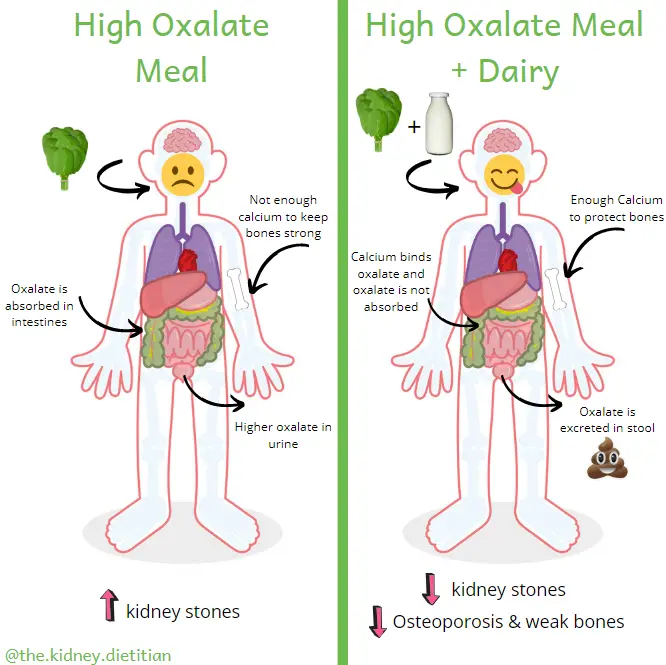
Protect Your Bones
The second reason calcium is so important for people with calcium kidney stones is bone health. People who have calcium kidney stones are at greater risk of bone fractures and weak bones. (2)
Eating enough calcium and vitamin D can help keep bones healthy and strong.
How Much Calcium Do I Need?
People with calcium kidney stones need the same amount of calcium as the general population. It is just even more important that people with calcium kidney stones meet their calcium goals!
Aim for 1,000 – 1,200mg of calcium per day.(3) (4)
One serving of dairy has 200-300mg of calcium. Ideally, eat one serving of dairy with 3 meals per day. These 3 servings of dairy, combined with small amounts of calcium from other foods, is a good way to be pretty sure you are eating enough calcium.
One serving of dairy is:
- 1 cup of milk or kefir
- 3/4 cup of yogurt or low-sodium cottage cheese
- 1 ounce of cheese – look for lower sodium cheeses like goat, mozzarella or Swiss
I’ve written a cookbook that includes dairy in all the recipes. I know that drinking milk with every meal can get boring!
Cow’s Milk Dairy First
When at all possible, I recommend cow’s milk dairy for people who have calcium kidney stones. Cow’s milk and dairy are, by far, the most calcium dense foods. And, dairy has lowered kidney stone risk in studies.(5)
If you have kidney disease in addition to kidney stones, the best milk for you might be different.
Skim vs. Whole Milk
The amount of fat in milk has little effect on the calcium amount. Skim, 1%, 2% and whole milk have basically the same amount of calcium.
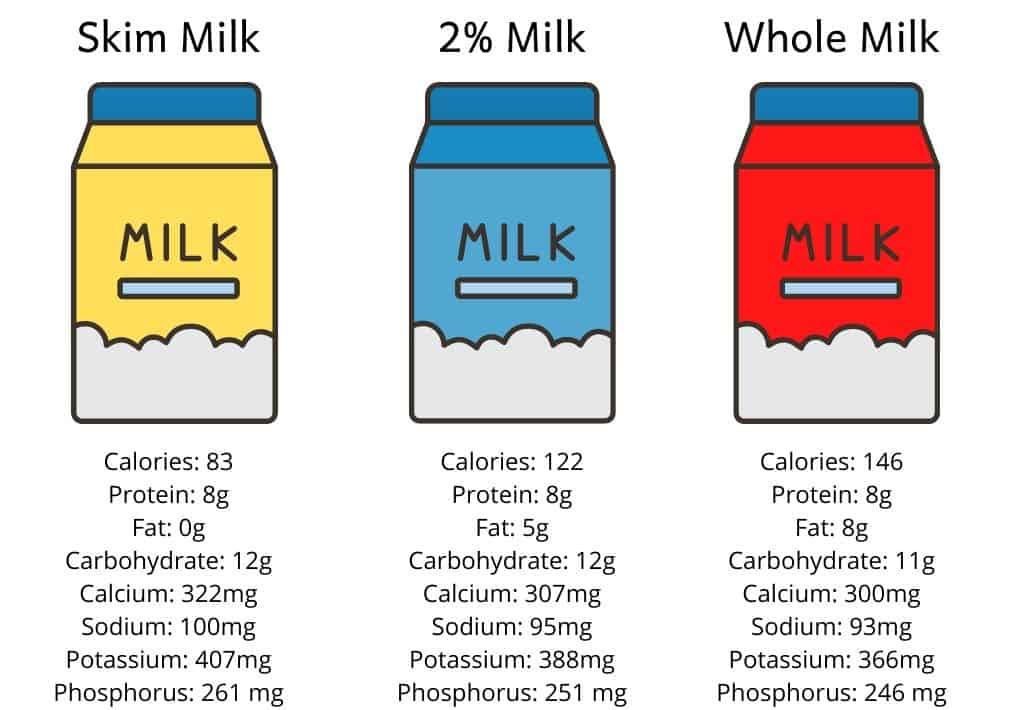
The one exception is dairy with a very high fat content. Foods like cream, cream cheese and sour cream are much lower in calcium.
Of course, the higher the fat content, the higher the calories and fat. For most people, I recommend fat-free or low-fat dairy.
Tips for Lactose Intolerance
The most common reason for milk intolerance is difficulty digesting lactose. Lactose is a sugar found in dairy. We need an enzyme called lactase to digest lactose. Without enough lactase, dairy can cause gas, diarrhea, cramping and other uncomfortable symptoms.
Start Slowly
The good news is that you can train your body make lactase again! Rather than dive in with 3 servings of dairy per day, start with just one (or even a half!) serving each day. Assess your symptoms for a few weeks and go up from there.
Start with Cheese or Yogurt
Cheese and yogurt tend to have less lactose in them. People who cannot tolerate milk often can tolerate cheese or yogurt.
Try Low Lactose Milk
Lactaid* and other lactose free dairy is a great option for people who have kidney stones.
You can also try Lactaid* in pill form when you eat dairy.
Good Non-Dairy Calcium Sources for Kidney Stones
Of course, milk is not for everyone. Many people avoid dairy due to cultural, religious, ethical or environmental reasons.
Of note, dairy has not been shown to cause inflammation in rigorous scientific studies. In fact, dairy has been shown to be anti-inflammatory in some cases. (6)(7)(8)
Most plant-based and non-dairy milk substitutes are supplemented with calcium. Because we know that calcium supplements tend to increase urine calcium more than natural sources, this is somewhat of a concern. However, no research has investigated the difference in urine calcium after consumption of natural and calcium supplemented foods.
Some calcium is certainly better than no calcium. Calcium from both dairy and non-dairy sources has been shown to reduce the risk of kidney stones.(9)
For people with a history of calcium kidney stones, dairy substitutes made from these milks are good choices.
- Rice Milk
- Oat Milk
- Coconut Milk
- Hemp Milk
- Pea Milk
Double check that the brand you buy is supplemented with calcium.
Dairy Substitutes NOT Recommended for Kidney Stones
These dairy substitutes are made from foods high in oxalate. Because oxalate is water soluble, it is a fair assumption that any liquid made from these foods will contain oxalate.
Although not everyone with kidney stones needs to avoid oxalate, I would recommend steering clear of these options. Adding these milk substitutes 3 times per day could add a very large oxalate load.
I do not recommend these milk substitutes for people with calcium kidney stones:
- Almond Milk
- Cashew Milk
- Soy Milk
Calcium From Plant Sources
Some plant foods are surprisingly high in calcium! These foods all have at least 60mg of calcium per serving (1 cup unless otherwise specified):
- Collard greens
- Spinach
- Kale
- Soybeans
- Broccoli
- Broccoli rabe
- Chia seeds (2 tablespoons)
- Tofu
- Edamame
- Okra
- Sunflower seeds (1/4 cup)
- Almonds
Italicized foods are higher in oxalate and not recommended for people with high urine oxalate levels.
However, the amount of calcium in most of these foods is still far less than dairy.
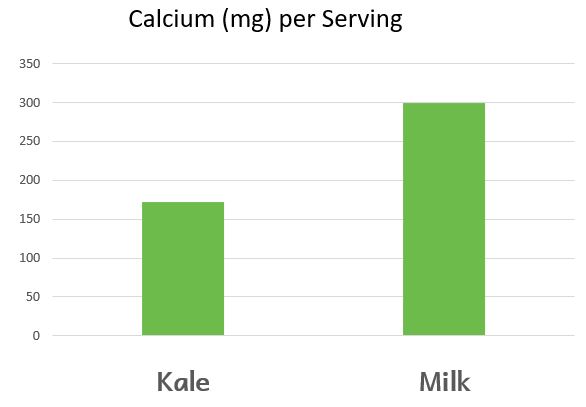
Importantly, calcium from these plant foods is not absorbed as well compared to dairy. Many of these foods are high in oxalate. Calcium is already bound to oxalate (and other compounds called “phytates“), which reduces absorption. In addition, because calcium is already found to oxalate, it will not do as good a job of binding other oxalate in that meal.
However, eating lots of fruits and vegetables is critical for kidney stone prevention.(1) Including some high calcium veggies can absolutely help get your to our daily goal of 1,000 – 1,200mg of calcium.
Calcium Supplements
Many patients ask “why can’t I just take a calcium supplement?”. Although this may seem like an easy fix, calcium supplements are not always the best choice for people with kidney stones.
The concern with calcium supplements is that supplemental calcium is much more likely to raise urine calcium than calcium that naturally occurs in food. This is very problematic for kidney stone formers because high urine calcium is the most common cause of calcium kidney stones.(1)
However, calcium supplements may be warranted in some people with kidney stones. Especially if urine calcium is normal. Work with your doctor to figure out what is best for you.
Happy Eating!
Melanie

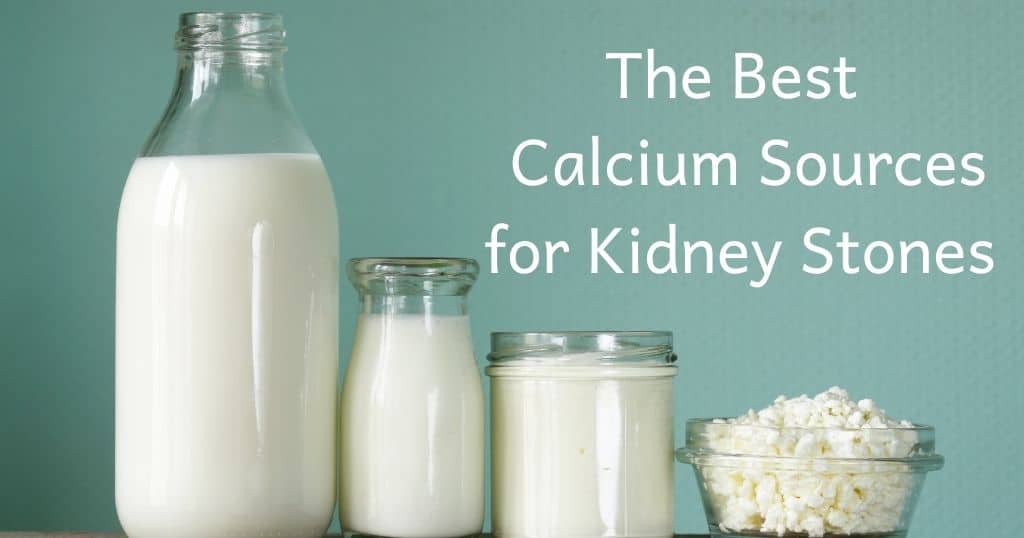
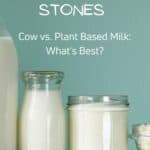
If I am going to eat something high in oxalates, like peanut butter or raspberries, how much milk or yogurt should I eat with it to counter balance the oxalates?
People ask this question ALL the time! The research isn’t advanced enough for me to even begin to answer this question. And honestly, it would depend on the food source of that oxalate, the calcium source and ALL of the other foods you eat in that meal. I discourage thinking this granularly about nutrition (because it will just drive you nuts and is totally unnecessary!) and rather just think about dietary patterns as a WHOLE. Simply eating enough calcium throughout the day most of the time is the goal!
Hello! I have been eating a lot of coconut yogurt before realizing that it is in essence a lot like taking a supplement since its calcium does not occur naturally. I’d like to switch to sheep yogurt as it has the same amount of calcium as cow’s yogurt. Do you see any issues with consuming sheep yogurt as far as getting calcium is concerned?
Not at all!
What about potassium citrate as a helpful supplement to protect against oxolates and kidney stones?
Potassium citrate can be helpful in SOME situations. But it is crucial to get a 24-hour urine test to know if potassium citrate is appropriate for you.
My kidney coach recommended Flax Milk highly.
Does this makes sense to you?
Jay R.
I really can’t say – it depends on your medical history, labs and current eating habits!
I don’t understand: supposedly calcium supplements can cause kidney stones, then why do you recommend plant milk with added calcium? Can’t I just add my own calcium and if not what is the difference between me adding calcium in the form of a supplement and the plant milk company adding calcium in the for of a supplement?
This is a great question and we don’t have good data to answer it. This is why I recommend dairy whenever possible. BUT, that calcium is SO important, I am ok with plant based substitutes if needed. Clinically, I usually don’t see spikes in urine calcium with fortified plant milk like I do with calcium supplements themselves.
Instead of commercial plant milk I d recommend making it yourself without those synthetic vitamins that you usually see on the label. Hemp milk is very easy to make: 1/2 cup of organic hemp seeds for 4 cups of filtered water, blend for 2 min.
Plant milks made yourself can be delicious. But they will not be good calcium sources.
Hi, what would you recommend for calcium intake if you are not able to have dairy because of casein intolerance which is different than being lactose intolerant?
This article outlines everything I would recommend!
I was told that protein is processed by the kidneys and I should limit my intake of it. This surprised me!
My 24-hour urine test revealed normal hormone function, which was the focus of the test due to a lobe detected on my adrenal gland.
My kidney stone was found to be a calcium-oxalte stone, and my urologist suggested that I consume milk with and reduce the amount of my chocolate chips and pecans nightly snack.
(I recently quit the chocolate entirely, though, due to gallbladder discomfort. I had my first gallbladder ‘attack’ at age 24, thirty years ago.
(I still have my gallbladder, thanks to my late husband’s strong opposition to the recommended surgery!)
Thank you for this website and your excellent suggestions!
Hi Meg! Thank you for your kind comment. It seems like your urologist gave you some good recommendations. This article about protein and kidney stones might be of interest to you as well!
Hi Melanie, I really appreciate all of your information on Kidney Stones, and especially preventions, (Calcium – since my 24 hours urine test results and my visit with the kidney clinic., I need to absorb 1,000 mg or more of calcium daily . I need help for a variety of foods with high calcium. Thank you.
This is such great info. When I passed my first stone and then had to have a biopsy for calcium deposits in my breast tissue, my doctor wanted to put me on calcium supplements and I didn’t do it. I didn’t want to contribute to the problem I obviously have with excess calcium. She wasn’t sure if the supplements would be a problem or not. I’m so, so glad I found you and the information you provide. I love me a glass of cold milk, so I’m trying to incorporate more milk in my diet.
Thank you so much for the kind comment! I’m so glad my content has helped. Also – yay milk!
Hi Melanie, I don’t like white milk is there any chocolate milk I can drink? I don’t feel like I can get enough calcium in a day without it.
Hi Laurie,
Yum! I love chocolate milk! I think having chocolate milk occasionally is fine. However, know that it does add quite a bit of sugar – which can also raise urine calcium levels and contribute to stones. I’d be worried about adding 3 servings of chocolate milk a day due to all the sugar. Yogurt and cheese are good options too! I also have cookbooks that are ALL about ways to incorporate dairy INTO your meals, rather than simply have a glass of milk on the side. These would help you a lot!
Chocolate milk is high in oxalates.
It is going to have some oxalate in it, but MOST people with calcium oxalate stones are making stones due to high urine calcium (not oxalate). PLUS, chocolate milk has a ton of calcium in it to help bind that oxalate anyway. I’m here to help people ENJOY food and prevent stones, not add to the endless guilt and “nos” out there for kidney stones.
Hi Melanie.
I love to eat popcorn as a snack, is it high or low in Oxalate ( plain, buttery or cheese ).?
Thank you,
Popcorn is my favorite snack too! It is low oxalate. However, popcorn can have a lot of sodium, so make sure you are choosing a lower sodium popcorn or making your own to control that salt!
Thank you Melanie for your response – very helpful.
Why does skim and 2% have higher levels of calcium than whole milk? Also more sodium.
Great questions! These differences aren’t really a big deal at the end of the day. Basically, it is just because it has less fat – so the space that fat would have taken up in 2% or whole milk is replaced with the LIQUID milk, which has the calcium and sodium. Hope that helps!
So are you saying that lactose free Milk and Dairy free butter and Dairy free cream will not help with kidney stones prevention??? The reason I take these is because I suffer with IBS as well and it definitely helps with IBS but if you suggest I take normal milk I will but may continue with Dairy free Cream. Thank you for all your Info. look forward to your reply
I recommend dairy first whenever possible. However, I fully understand some people can’t tolerate it, or avoid dairy for other reasons. As long as a plant based dairy alternative is supplemented with calcium, it will do what we need it to! Everyone is different! Ultimately, I would need to understand your situation better and look at your 24-hour urine test results to figure out what is best for you!
How about calcium-fortified orange juice? I get tired of milk, milk, milk at every meal. Is fortified OJ 2-3 times a week bad for stones?
I’d have to know more about your urine test and current eating habits to know for sure. But, in general I don’t love significant amount of any juice for kidney stones.
for milk substitute in particular Good Karma Flaxseed milk does it have supplemented calcium? My 24 hr urine test showed high calcium. I’m wondering if this brand is supplemented with calcium. I do not tolerate dairy and enjoy flaxseed milk.
Most milk substitutes are supplemented with calcium. You can tell by looking at the nutrition facts label. If there is more than 5% (or so) of your DV of calcium in there, than it is likely supplemented. Look at the ingredients to tell as well!
hi Jennifer what is the recommended amount of oxalate for children?
There isn’t a recommended amount of oxalate to eat per day for either adults or children. The guidelines only suggest to “limit dietary oxalate” based on 24-hour urine test data. In my experience, 9/10 times, when people get in enough calcium, urine oxalate comes TUMBLING down to normal (if it was even high in the first place).
Is calcium in premixed protein shakes and in protein powder processed the same as a calcium supplement/pill which contributes to kidney stones, or in the calcium on protein shakes a good source to boost calcium. I have had kidney stones and also have osteopenia and try to get my calcium through foods which also include protein shakes. I do not take calcium pills. Thank you for any information you can provide.
It is honestly hard to say. I’d probably be more concerned about all that protein in the protein shake, honestly. I touch on that here!